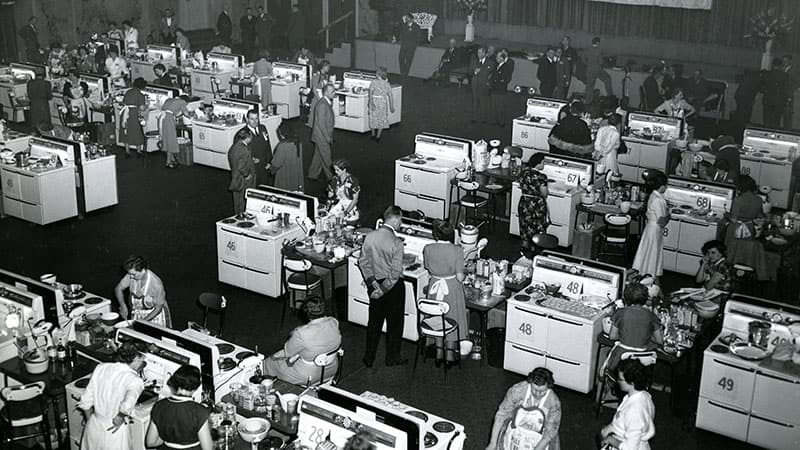
Pillsbury Bake-Off contest a slice of American home baking history
After studying the evolution of American food culture through the lens of corporate influence, Dr. Sarah Elvins shared her findings on the topic at a Food Systems Research Group seminar hosted at the University of Manitoba on November 28th, 2018.
When it comes to the study of food, there has been a recent explosion in the academy and beyond to research the subject from a variety of angles including its activism, policies, nutrition, science, and social history. While many researchers are interested in researching food through these lenses, Dr. Sarah Elvins, associate professor and an American culture and business historian at the University of Manitoba, has a particular interest in studying how American food culture has evolved in the decades following World War II with the rise of corporate recipes.
HOW HAS COOKING IN AMERICA EVOLVED?
Before diving into the study of American food retailing and marketing, Elvins opened her Food Systems Research Group seminar with a recipe for ‘Bakers Bread’ from the 1850s to show just how dramatically recipes have changed over the past 160 years. The recipe had no measurements, temperature or cooking time, and even compared the amount of alum needed to the size of a hickory nut. Evidently, bakers in the 1800s needed to be skilled in the kitchen and competent with little direction.
Using archival materials from the popular Pillsbury Bake-Off contest, including winning recipes, Elvins was able to explore how American home cooking has evolved over time because of the tremendous influence of household names like Pillsbury. From the time the bake-off began in 1949 to the 1950s, Elvins explained that “the contest celebrated elaborate and time-consuming, skillful recipes.” During the early years of the competition, some of the winners included multi-layered cakes, pies with peanut crust and 18 ingredient recipes. At the time, the only requirement was that the recipes needed to include Pillsbury flour.
Just ten years later, the requirements for the recipes changed; the use of convenience foods like cake mixes, pre-made dough, frozen goods, and ready-to-bake pie crusts were required. Many of the winning recipes beginning in the 1960s used five ingredients or fewer. In 1969, a woman took home 1 st place after making Magic Marshmallow Crescent Puffs which were simply marshmallows dipped in melted butter and cinnamon and then wrapped and cooked in pre-made refrigerated crescent roll dough.
HOW WERE CORPORATIONS CHANGING FOOD CULTURE?
The message to consumers was that the less time a woman had to spend in her kitchen made for more time being spent with her family. Mothers and wives who valued their reputations as such bought into this notion being sold by large food manufacturers who wanted to normalize pre-packaged food which can be seen through the bake-off winners using, “triple short-cutted recipes.” Finally, women didn’t need a high level of skill or direction in the kitchen to be successful cooks as recipes now included, “ten stages along with every step.” So, along with catchy slogans like, “It used to take all day to make bread this good!” American food culture was being shaped because of the way corporations like Pillsbury, through their annual bake-off, retailed and marketed their products.
Elvins finished her seminar by summarizing a few distinct changes in dialogue surrounding the purpose of home cooking and baking that food manufacturers like Pillsbury influenced. Even with the addition of pre-made goods, women still considered themselves to be authentic cooks and bakers and to be making their food dishes from scratch. Along with the redefinition of authenticity, ease and simplicity in recipes were changed to refer to the use of prepackaged goods, while being skillful shifted to selecting the right products rather than having advanced culinary technique. Evidently, corporations continue to have the power to shape society’s notions of what food means to each family and how it is used.
Pillsbury has also evolved since the beginning of their bake-off. Now the food manufacturer has more than 127 pre-packaged convenience foods on the market, compared to its original product, flour, on which the competition was founded. And yes, the annual bake-off still takes place – the 2018 winning recipe was Bejeweled Cranberry-Orange Rolls.
FOOD FOR THOUGHT KNOWLEDGE SHARING SERIES
What is the Food Systems Research Group? The FSRG is an umbrella group fostering the creation of multi/trans-disciplinary collaborative research to advance the theme of Safe, Healthy, Just and Sustainable Food Systems.
The FSRG hosts a monthly seminar series featuring UofM research on food systems – joining our mailing list to receive upcoming notifications by sending an email to foodsystems@umanitoba.ca.
Sara Poppel is an economics student in her second year, currently helping with communications with the Food Systems Research Group and the National Centre for Livestock and the Environment.






